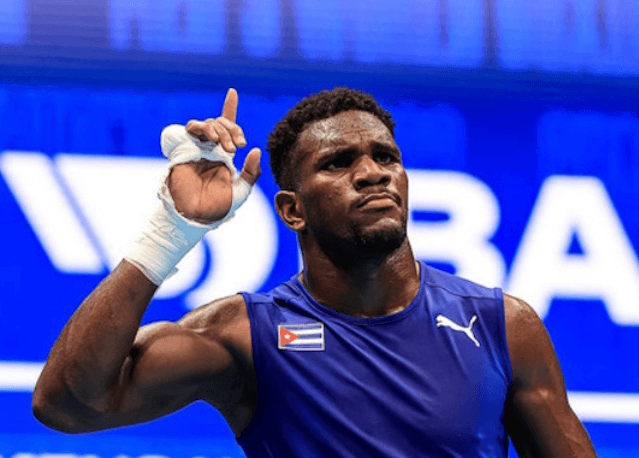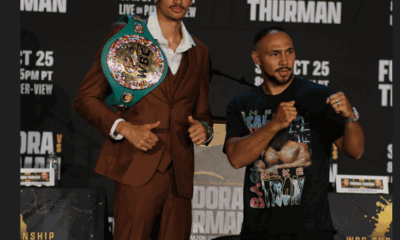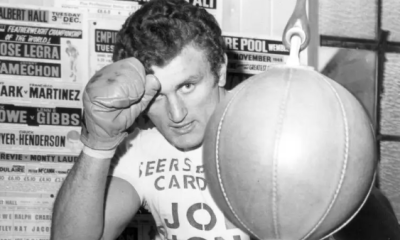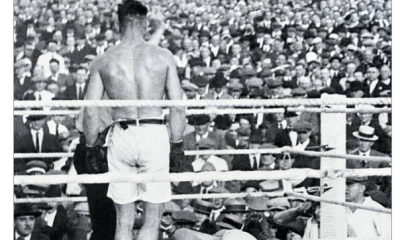Featured Articles
Reflections on Yoenli Hernandez and the New Wave of Outstanding Cuban Boxers

Reflections on Yoenli Hernandez and the New Wave of Outstanding Cuban Boxers
Cuban boxers were 2-0 at the T-Mobile Arena on Mexican Independence Day weekend in Las Vegas. Erislandy Lara toyed with listless Danny Garcia for nine rounds before Garcia’s corner stopped the bout. Yoenli Hernandez improved to 5-0 with his fifth knockout, dismissing his Mexican opponent in the second round.
Lara, who was appearing his nineteenth 12-round fight, is 41 years old. Yoenli Hernandez (pictured) is 27. However, although separated by only 14 years, they effectively represent two different generations of Cuban boxers. Hernandez is part of the new wave that includes super-hot prospects Arlen Lopez and Andy Cruz.
A light heavyweight, Lopez, 31, was an Olympic gold medalist in Rio and in Tokyo, but came up short in his bid to become only the fourth boxer (and third Cuban) to achieve the Olympic hat trick, losing a split decision to Ukraine’s Oleksandr Khyzhniak in the semi-final round of the recent Paris Games. As a pro, he’s 3-0 (2 KOs).
A lightweight, Andy Cruz, 29, was 4-for-4 against Keyshawn Davis as an amateur, with the last of those four wins coming in the gold medal round of the Tokyo Olympiad. He’s 4-0 (2 KOs) as a pro with all four of those wins coming against experienced opponents in matches slated for 10 rounds.
Yoenli Hernandez (sometimes identified as Yoenlis Feliciano) wasn’t an Olympian, but he was a World Amateur Champion who finished his amateur career with 26 straight wins. He turned pro along with Arlen Lopez and four other elite Cuban amateurs on May 20, 2022 in Aguascalientes, Mexico, an historic day in the history of Cuban boxing as it was the first time that members of the Cuban National Team competed as pros with the blessing of the Cuban government.
—
Cuba has spawned a number of notable boxers over the years. Kid Gavilan, the Cuban Hawk, master of the bolo punch, won the world welterweight title in 1951 with a unanimous decision over Johnny Bratton at Madison Square Garden and successfully defended it seven times. By some accounts, he was Cuba’s first true world title-holder. Kid Chocolate (Eligio Sardinas) captured world titles as a featherweight and a junior lightweight in the early 1930’s, but neither title was recognized overseas — the junior lightweight division then lacked traction and his featherweight diadem was the New York State version of it.
Kid Gavilan and Kid Chocolate have plaques in the International Boxing Hall of Fame as does Luis Rodriguez who captured the world welterweight title at LA’s Dodger Stadium in 1963 in his second of four meetings with arch-rival Emile Griffith. Rodriguez and his compatriot Florentino Fernandez, a world title challenger as a middleweight, both had their first U.S. fights in 1959, the year that Fidel Castro’s rebels overthrew the Batista regime. They trained at Chris Dundee’s iconic Miami Beach gym alongside the fighter who would take the name Muhammad Ali.
Two future greats — featherweight Ultiminio “Sugar” Ramos and welterweight Jose “Mantequilla” Napoles — left Cuba a bit later and settled in Mexico. Although they won world titles in U.S. rings, they never left their adopted home. Both were residents of Mexico City at the time of their passing.
—
As is well known, Fidel Castro abolished professional sports. Moreover, there was a long lag after he came to power before elite Cuban boxers had the temerity to defect.
Cuban boxers dominated the 1992 Barcelona Olympics, sending nine of a possible 12 boxers to the gold medal round, seven of whom emerged victorious. Of the medal winners, only bantamweight Joel Casamayor left for the United States, and he did not defect until four years later on the eve of the Atlanta Summer Games. Eventually 12 other Cuban boxers – several who arrived in the U.S. before him — would join Casamayor in a stable that took the name Team Freedom. Casamayor was the best of the bunch, winning world titles as a pro at 130 and 135 pounds.
Team Freedom evolved into Warriors Boxing. The South Florida agency, run by Luis De Cubas Sr. and Leon Margules, is the dominant force in the Cuban-American boxing community. De Cubas, who once owned a piece of Roberto Duran, was born in Cuba and spent his formative years in Minnesota before settling in Miami at age 24. His business partner Margules is a Fort Lauderdale attorney.
Yoenli Hernandez’s manager of record is Providence, Rhode Island businessman Robert Valle, but Warriors Boxing, which also controls WBA (regular) light heavyweight champion David Morrell, has its fingers in the pie. Virtually every boxer who defected from Cuba during the Castro years was helped along the way by Luis De Cubas and his associates. His name now appears on the ballot for the International Boxing Hall of Fame and it’s a fair guess that he will go in with the next class of inductees.
In many ways, things have gotten worse in Cuba since Fidel Castro passed away in 2016. More than a million Cubans – roughly 10 percent of the population – left the island nation between 2022 and 2023, the largest wave of out-migration in Cuba’s history. Of that number, more than 400,000 settled in the Unites States, mostly in the Miami area.
Within that diaspora were many of Cuba’s most talented boxers. Those that leave for greener pastures are no longer stamped an enemy of the state. Restrictions have been eased for people traveling back and forth between the two countries.
Cuban boxers were well-represented on the rosters of the teams in the newfangled Team Combat League where men compete in one-round matches across six weight categories. One doesn’t have to like the concept to appreciate the fact that the TCL has been a godsend to boxers who would otherwise have trouble staying busy while also putting a few dollars in their pocket to help pay the bills during the lacuna between conventional prizefights.
The novice professionals from Cuba who have competed in these events tend to be younger than their predecessors who left Cuba to launch their pro careers. To take but two examples, light heavyweight Brayon Leon and welterweight Darian Castro, both strong prospects who excelled at the TCL brand of fisticuffing (a combined 22-2) are 22 and 21 years old respectively.
The takeaway is that we will be hearing a lot more about Cuban boxers in the next few years. And if Yoenli Hernandez becomes a big name in the sport, remember that you heard it here first.
To comment on this story in the Fight Forum CLICK HERE
-

 Book Review4 weeks ago
Book Review4 weeks agoMark Kriegel’s New Book About Mike Tyson is a Must-Read
-

 Featured Articles2 weeks ago
Featured Articles2 weeks agoThe Hauser Report: Debunking Two Myths and Other Notes
-

 Featured Articles3 weeks ago
Featured Articles3 weeks agoMoses Itauma Continues his Rapid Rise; Steamrolls Dillian Whyte in Riyadh
-

 Featured Articles2 weeks ago
Featured Articles2 weeks agoNikita Tszyu and Australia’s Short-Lived Boxing Renaissance
-

 Featured Articles4 weeks ago
Featured Articles4 weeks agoKotari and Urakawa – Two Fatalities on the Same Card in Japan: Boxing’s Darkest Day
-

 Featured Articles3 weeks ago
Featured Articles3 weeks agoIs Moses Itauma the Next Mike Tyson?
-

 Featured Articles4 weeks ago
Featured Articles4 weeks agoRamirez and Cuello Score KOs in Libya; Fonseca Upsets Oumiha
-

 Featured Articles2 weeks ago
Featured Articles2 weeks agoBoxing Odds and Ends: Paul vs ‘Tank,’ Big Trouble for Marselles Brown and More





















